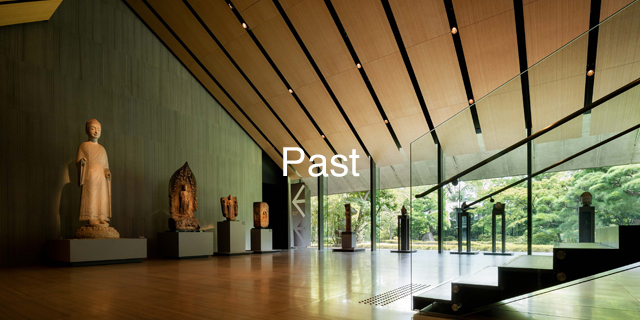
-
Museum Collection Exhibition
Shared Beauty
Detached Segments of Ancient Japanese Calligraphy - Saturday, December 21, 2024 – Sunday, February 9, 2025
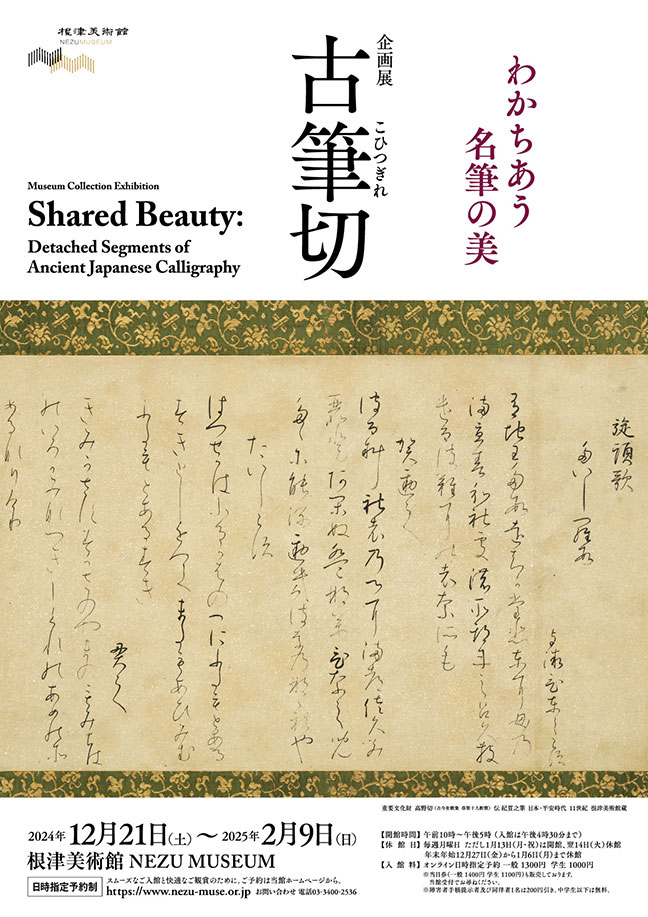

| Closed | Mondays, except January 13, and closed on January 14 and New Year Holidays from December 27 to January 6, 2025 |
|---|---|
| Hours | 10 a.m. - 5 p.m.(last entry: 4:30 p.m.) |
| General admission (On-line timed-entry tickets) | Adult 1300 yen, Student 1000 yen |
| Gallery | 1 |
In Japan, examples of old calligraphy are generally called kohitsu, “ancient handwriting.” In a narrow sense, that term refers to Japanese calligraphy in poetry collections from the Heian through the Kamakura periods (794–1333). During the Heian period, aristocrats commissioned talented calligraphers to copy the Kokin Wakashū Poetry Anthology, other poetry anthologies, or their private collections, for use as gifts or furnishings. During the Muromachi period (1392–1573), single sheets or pages or even a few lines were extracted from those works for the increasingly popular tea gatherings and for personal appreciation. Those segments detached from ancient calligraphic works are known as kohitsugire, “detached segments of ancient Japanese calligraphy.”
This exhibition showcases examples of these detached segments of ancient calligraphy from the Heian through the Kamakura periods, primarily from our collection. The focal point of this exhibition is a recent acquisition, the Kōya-gire (Detached Segment of the Kokin Wakashū), an Important Cultural Property. Please enjoy the beauty and unique appeal of each of these examples of ancient calligraphy.
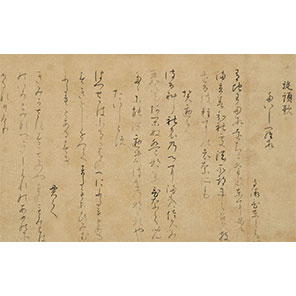

- Kōya-gire (Detached Segment of the Kokin Wakashū Poetry Anthology, Vol. 19) Attributed to Ki no Tsurayuki
- Hanging scroll; ink on decorated paper
- Japan Heian period, 11th century
Nezu Museum - The Kōya-gire (Detached Segment of the Kokin Wakashū Poetry Anthology, Vol. 19) includes four poems, each a sedōka or poem with six verses in a 5-7-7-5-7-7 syllable format. This precious work, mounted on a hanging scroll, is the oldest example of calligraphy from a copy of the Kokin Wakashū. Classified as the “third style of calligraphy” found in this copy of the anthology, its quick, rapidly flowing strokes are reflected by the mica-dusted surface of the paper.
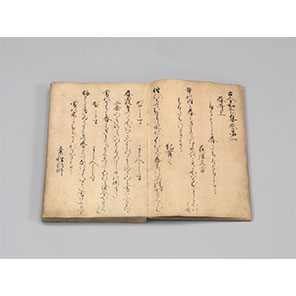

- Kokin Wakashū Poetry Anthology By Fujiwara Tameuji
- Book; ink on paper
-
Japan 13th century, Kamakura period
Nezu Museum - The earliest collection of Japanese poetry, the Kokin Wakashū Poetry Anthology was revered as the standard for poetry and frequently copied for copybooks and gifts. Other copies, like this book, however, were created to accurately transmit the text. According to the colophon, the calligrapher and the timing of the copying are clear, making it especially valuable.
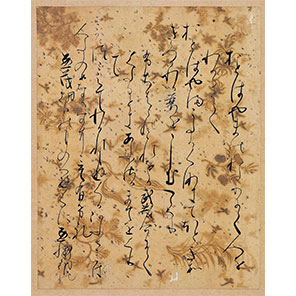
- Ishiyama-gire (Detached Segment of the Tsurayukishū Poetry Anthology) By Fujiwara no Sadanobu
- Hanging scroll; ink on decorated paper
-
Japan Heian period, 12th century
Nezu Museum Gift of Kobayashi Ataru - This segment of the Tsurayukishū Poetry Anthology, Vol. 2, was split from the Honganji temple collection of the anthologies of the Thirty-six Immortal Poets in 1929. It features the skillful and dynamic calligraphy of Fujiwara no Sadanobu (1088-1154) on paper adorned with fine pieces of gold and silver foil and underdrawings in silver pigment.
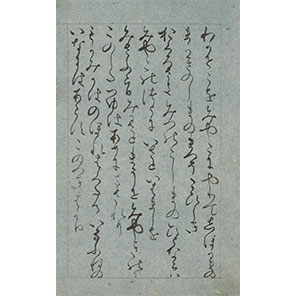
- Imaki-gire (Detached segment of the Kokin Wakashū Poetry Anthology, Vol. 20) By Fujiwara no Norinaga
- Hanging scroll; ink on decorated paper
-
Japan Heian period, 12th century
Nezu Museum - This detached segment is from a thread-bound book made of plain, pale brown, indigo, and other dyed sheets. The discovery of a fragment of the latter half of the colophon and a transcription of the full colophon, however, has permitted identifying it as a rare example of calligraphy by Fujiwara no Norinaga (1109-80).
